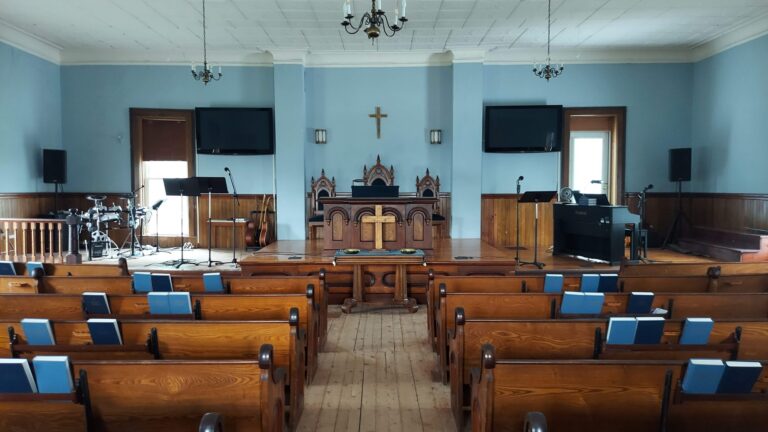The following is a conversation between Pastor Joshua Moore of Red Door Church in South Royalton and Dan Isadore (M.Div.), a recent graduate of Pittsburgh Theological Seminary and Associate Director of the Pittsburgh Experiment. Josh and Dan hope to have regular discussions on various theological topics and important issues facing Christians today.
Dan: So here’s a loaded question for you Josh: do I need to go to church to follow Jesus?
Josh: This is a good question. Probably the first thing that comes to mind is the need to define what we mean by the word church. Is the church a building; just brick and mortar? Or is the church just another 501c3 non-profit organization that specializes in helping facilitate and organize Christian spirituality? Or is the church something else?
The Bible doesn’t give us dictionary like answers about these sorts of questions–it’s not a book of definitions–but what the Bible does tell us about the church is that it is a body of people who believe on the Lord Jesus Christ. The apostle Paul uses the imagery of the human body to describe the church in his first surviving letter to the Corinthian church. He says that we are all members of the same body and each member serves a particular function, namely, to build up the body for the common good.
So this gets back to the way you phrased the question: if the church is mainly a collection of believers, then what do we mean when we say “go to church”?
The phrase “go to church” is couched in an understanding of what the church is that may be unbiblical. That’s not to say that there aren’t ways to use the phrase that are appropriate, of course, but for most folks (at least in my experience), the statement is a reflection of what they believe about following Jesus and is therefore problematic. Because for so many today, following Christ is not really following a person but rather adhering to a list of rules one of which is attending this thing we call church on Sunday morning.
What this means is that they aren’t really following Jesus at all. They are trapped in man-made religion which is always works oriented; do this and don’t do that and you’ll achieve salvation or enlightenment or you’ll have good Karma or whatever. “Going to church” for these folks is just a part of the do-this-do-that system. But this is the very antithesis to the teaching of Jesus.
However another important aspect to this question is context. In New England where I am stationed at the moment, most people take it for granted that church is not a rule on the list that must be followed if one is to be saved. Up here what you find is that people struggle to see the purpose of church altogether. Gathering together with other believers on Sunday morning or during the week for public worship, the reading of Scriptures, prayers, and the celebration of the sacraments, is in many cases seen as an unimportant footnote in the Christian life. The hard part up here is convincing people of the importance of “going to church.”
Dan: Why is it like that in New England?
Josh: Well I’m not entirely sure. I’ve only been here a short time, but here’s my hunch: One of the most deeply rooted values in New England is independence. People don’t want to believe or recognize that they have a need for others.
And as I understand the teaching of Jesus, I think a healthy realization of our need for other people is one of the core, proper motivations for weekly, or at least regular church attendance. Its not to believe that in gathering with other believers I’m somehow “saved” in a legal sense, but its the deeply rooted belief that without the help of other believers and the grace bestowed upon me in the exercise of the sacraments and the public proclamation of the good news week after week and the blessing of hearing others pray and so on, I simply will not persevere to the end.
To try and condense what I’m saying for you: When a person believes deep within their spirit that they need other believers and that having others believers involved in their lives intimately is one of God’s ordained means of working out our salvation and granting us the ability to persevere until the end, I think they will begin to find Church a very significant part of their lives. In that sense I think that “going to church” is an indispensable part of following Jesus.
Dan: It sounds like you are saying that we need to be intimately connected to other people if we are to follow Christ; that the Christian life is not something that we are able to do on our own?
Josh: Yes, that’s what I’ve been saying in a nutshell.
Dan: So what if I’m not connected to others? Is that even possible in our own day when connectivity seems more readily available than ever? Is there a “bare minimum” in this walking alongside of each other? Or is the search for a bare minimum misdirected?
Josh: This is a legit question. In today’s world where real connectedness seems to evade us. Despite the fact that more and more people are living in major cities and despite the preponderance of social media, intimate relationships are harder and harder to find. So, good question.
When we look at the Bible what we see is a God that works in the context of human relationships. From the very beginning God made man in His image. God is relational (Trinity), so we are relational. The Trinity shows us that relationship is a very part of the being of God.
So relationships are not optional; they are indivisible from our design after the image of God our maker. This is true of all humans whether believers in Christ or not. Believers, however, make it their life’s goal to conform to God’s design and not to contradict it. So I would argue that a life of ongoing, intentional, reclusiveness and isolation is contrary to the design of God.
Dan: Believers, in other words, are those who embrace their design as relational persons and seek to live accordingly.
Josh: It’s no less than that anyway. Speaking of the bare minimum question, that’s tough because each human is different and requires a different measure of real connectedness to thrive and to fulfill God’s calling upon their lives.
Dan: Could we say this then, that relationships are not optional for Christians, not because they get you a box checked off, but because they are more like a door? In other words, relationships are the very stuff of Salvation, of living life with God. To forsake relationships is to forsake Christianity, because Christianity is about embracing who God has made us to be: His image, which is persons in relationship sharing deeply in each other’s life in God.
So maybe the better question might be something like, “How do I connect with others and with God in my unique circumstances?”
Josh: Yes, because the God-man Jesus coming to earth reveals to us the intensity with which God desires relationship with his creation; relationships are fundamental to Christian faith.
Dan: That really is why he came: for relationship.
Josh: Amen.



